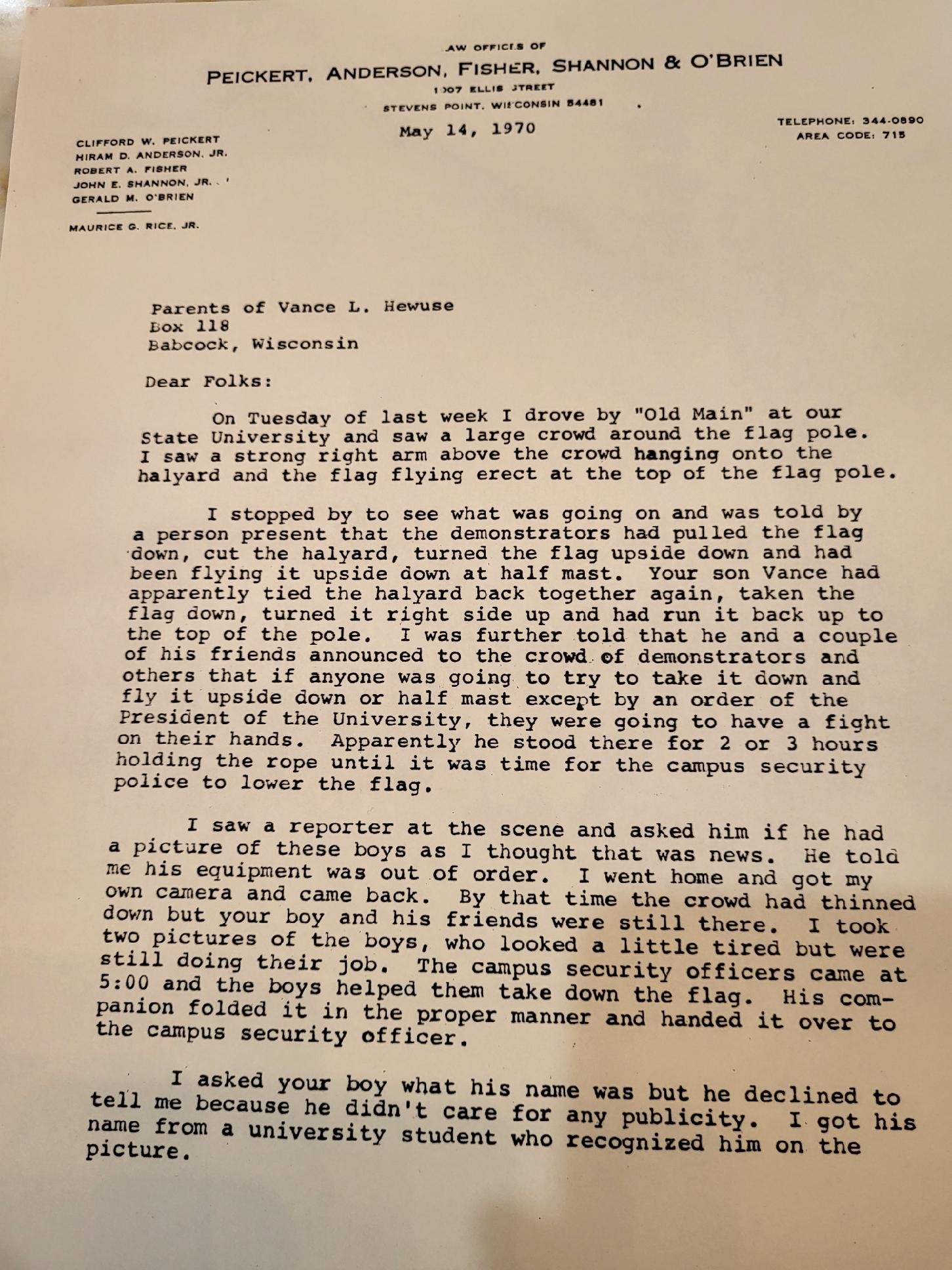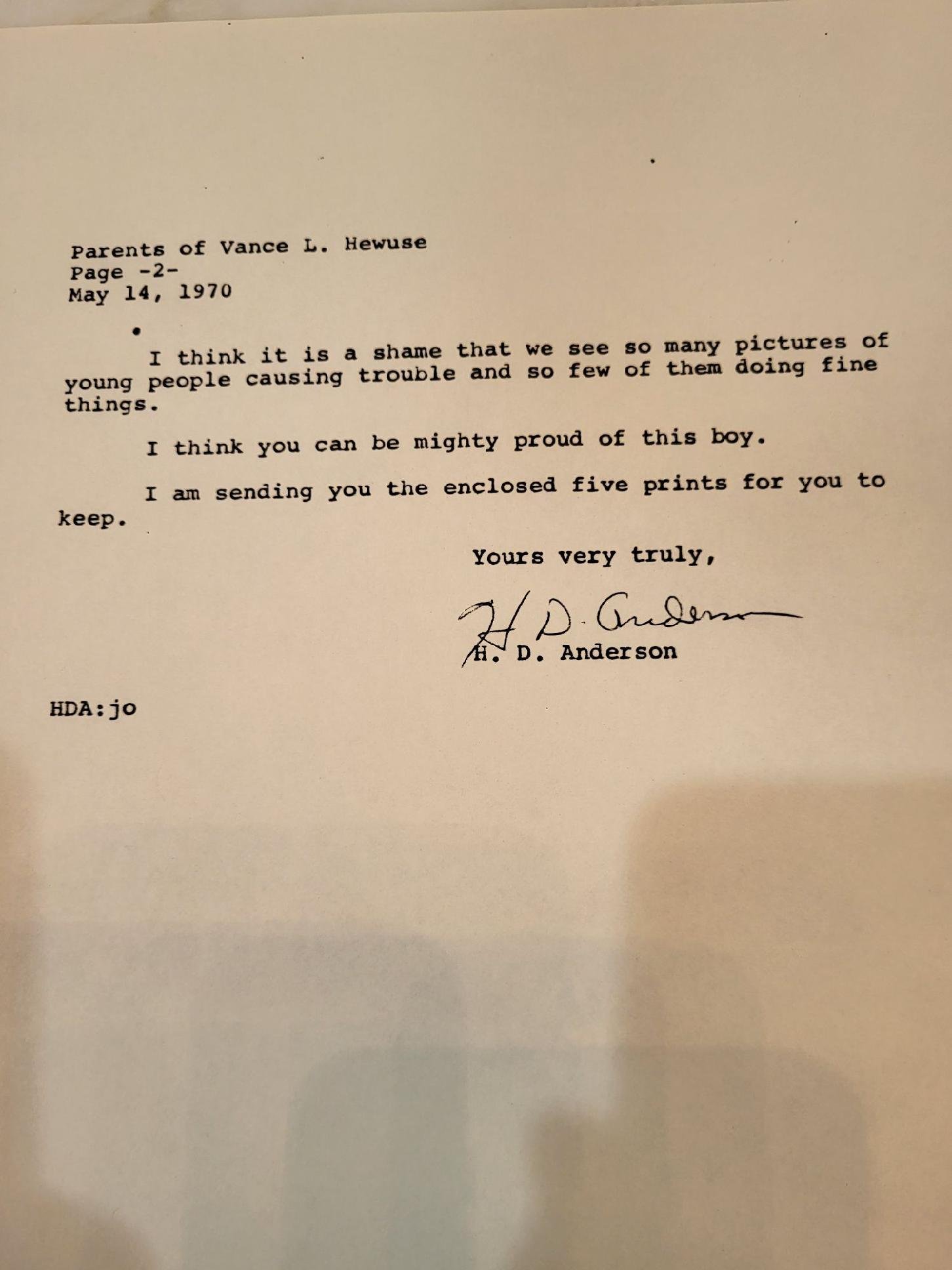A Soldier's Burden: Vietnam Veteran Vance Hewuse's Journey to Acceptance
Hewuse conducting recon in Vietnam. Photo provided by Vance and used with his permission.
In the heart of Colorado, amidst the foothills of Pikes Peak, resides Vance Hewuse. He’s the 1982-83 Colorado Gold Panning Champion, a gold medal-winning Senior Olympian, and a combat-wounded Vietnam veteran. Hewuse has lived a full life and has many stories to share.
Today, he’s not going to tell us how to “get gold out of them thar hills” or how to place for your age group in a race. He’s going to share his journey from serving in 57 operations in just over a year to finally getting help for post traumatic stress disorder (PTSD) 40 years later. It’s a story of courage, resilience and acceptance that many combat veterans share.
Hewuse was born and raised on a small farm in central Wisconsin. In addition to raising crops, he and his brothers cut and shipped timber to paper mills and raised hogs. After high school, Hewuse enrolled in a seminary in Saskatchewan, Canada. In December 1965, he was told he could not return to the seminary for operating and participating in "prohibited boxing activities." Hewuse and a buddy would find unused classrooms to set up boxing matches and charge other students to watch them box. His enterprising personality wasn't a good fit for seminary but would later come in handy when he was thrust into the tumultuous theater of the Vietnam War.
Hewuse received his draft notice and entered the U.S. Army in August 1966. He answered the call because he felt it was his duty to serve his country. Little did he know, he’d serve in Vietnam Counteroffensive Phase II and III as well as Tet Counteroffensive Campaign operations in just over a year.
Hewuse helps secure a drop zone in Vietnam. Photo provided by Vance and used with his permission.
Hewuse was assigned to Delta Company, 2nd Battalion, 7th U.S. Cavalry Regiment (Ghost Battalion), as an Infantryman. Most of the operations he served in were 3-14 day missions his platoon executed in the dense jungle foliage of Vietnam's central highlands and the rice paddy villages bordering those highlands. The threat of ambush, booby traps, and snipers was constant.
"Every day, there was the possibility that you or your buddies could be wounded or killed," he recalls, his voice tinged with the weight of memory. "There's a real fear that something is going to happen, and something inevitably happens, but you take the objective and don't let fear direct your path."
Hewuse recalls it took only about four months for a "cherry boy" (fresh recruit) to become battle-hardened and angry in Vietnam. It's easy to understand why. Like many of our Vietnam veterans, Hewuse was "in the jungle the whole time." He was never in secure areas except for resupply or treatment for foot infections he got from constant leech bites and wet jungle terrain. He was also shot multiple times. Hewuse explains, "If you were shot in Vietnam and it didn't go through a bone, you were sent back out into the field after you recovered." That's what happened to him on his most memorable day in Vietnam.
Staff Sergeant Roberts poses with a bamboo pit viper, aka “two step snake” because you’d be dead within two steps if one bit you. Photo provided by Vance and used with his permission.
On 22 November 1967, Hewuse's platoon was flown into an area 40 kilometers northwest of Phan Thiet to flush out two Viet Cong soldiers seen in the area. It was supposed to be a fast search-and-destroy mission. The Landing Zone (LZ) was a dry rice paddy surrounded by dense foliage. Hewuse recalls they "didn't have an officer and were short 13 men and no machine gun and nobody was carrying more than eight, 20 round clips and 2 grenades, standard practice when we were just going out to run down stray Cong for capture." As the last of four 'Hueys' pulled away from the landing site, Hewuse's platoon began receiving heavy fire. This was a big intel miss. Hewuse and his men were surrounded by over 300 well-camouflaged North Vietnamese Army (NVA) soldiers with predefined fields of fire.
The battle lasted 18 hours and Hewuse describes it as his "second birthday" because "we were all shot that day and 10 of us didn't make it back home." Two of those men were killed just feet from Hewuse and one was his Platoon Sergeant and mentor, Staff Sergeant Roberts. With Roberts KIA, Hewuse became acting Platoon Sergeant.
Hewuse low crawled forward to assist Rameriz who was screaming from the pain of a round to the arch of his foot. Hewuse told him to stay put and reduce his rate of fire to one shot intermittently to conserve ammo. Hewuse continued low crawling to share ammo with Smitty. He took a big hit to his side yet managed to mitigate the sniper and moved close enough to Smitty to throw him the ammo satchel and then crawled back to his RTO (Radio/Telephone Operator). Hewuse called for smoke but the radio was out.
“Like a lot of warriors when pinned down and bleeding from the hit, I wrote a check to God I knew I couldn't cover but knew His Son, Jesus, could.” Hewuse woke up two days later in the 36th Evacuation Hospital. "The bullets went through my thigh, hip and lower back without hitting bone leaving a seventeen-inch scar and a couple of bullet holes. After 27 days, I was sent back to Bong Son to take my platoon on a couple more scouting ops in prep for the Tet Offensive." Thirty days later a supply chopper extracted Hewuse to send him back to the states to Fort Lewis, WA still in his sweaty jungle fatigues.
Members of Hewuse’s platoon. Pictured are Rameriz, Thomas, Hill and Serk. Photo provided by Vance and used with his permission.
Despite these experiences, Hewuse displayed resilience and leadership. His actions on the battlefield saved lives, earning him respect from his fellow soldiers. "I was proud that, as a draftee accelerated to Sergeant, I was able to save some of my guys and to make sure they got home," he reflects.
Hewuse's own return home was met with a different kind of battle. "When I got home, I went down to see my sister, who was in the Navy, in San Diego with a plane change in San Francisco. When we entered the terminal, we encountered a different public than we had left. We were cursed and spit at and called a few choice names," he recounts. The anti-GI, anti-war sentiment only stoked the unresolved anger, fear, and grief Hewuse had inside.
A few months after his return, Hewuse enrolled in the University of Wisconsin - Stevens Point. He recalls how he was always "looking for that action." In May of 1970, when walking back from class with a friend, they observed one of many anti-Vietnam War protests happening on campus. Hewuse was abhorred at seeing protesters trying to take down the American flag on the lawn of UW-SP’s Old Main Building, with a crowd of several hundred yelling "Burn it!" Hewuse asked his friend Jerry if he had any plans for the afternoon. He said "No." "Well, I told him I'm going over to the flagpole and grab the halyard from them and pull the flag back to full mast." And that's what Hewuse did with Jerry’s help.
Jerry, a 6' 5" 260-pound 4-year varsity tackle from the University of Illinois, led the way through the crowd. It was like he "parted the sea." When the two of them made their way through the crowd to the flagpole, Hewuse grabbed the halyard and raised the flag back up. The crowd screamed and spit at them. Hewuse responded, "This flag stays up here until the people of the United States say it no longer represents them. Until then, the only way it's coming down is over my dead body." They stood watch until the security guards came by much later. “Jerry and several other supporters took the flag down, folded it up, and gave it to security.”
Yet, despite how Hewuse appeared, the social turbulence of the times reflected the inner turmoil Hewuse felt. "I was spiritually in a desert and became a workaholic to cope. My anger had to be continuously suppressed." But that only works for so long.
In 2008, everything came to a head for Hewuse. He was an insurance adjuster and assigned to a Texas hurricane when a brief encounter with a business owner triggered him. He woke up around 0300 on a Galveston beach and didn't know how he got there. He flew back home and was checked into the Department of Veterans Affairs mental health unit.
40 years after his service, Hewuse was finally diagnosed and treated for PTSD. He was in therapy for eleven years. It helped him to distinguish the difference between his grief, fear, anxiety, action, memories and dreams. It also helped him accept what happened.
He shares, "When you accept what happened, you can accept the 'Atta boy' and start shedding a bit of the survivor's guilt. As for the battlefield mistakes and atrocities, I can now come before God, for forgiveness. But forgiving myself, well, that's a process."
Hewuse carrying the flag during the Run 2 the Shrine 2023. Photo provided by Vance and used with his permission.
Today, Hewuse honors the memory of his "guys" by contributing to veteran organizations. Hewuse promotes healthy lifestyles with 4-mile daily runs and demonstrates to seniors how to remain active after 65 through his organization Heel, Toe, Shoe Your Soul. He also mentors younger veterans to keep in shape.
Hewuse urges his Vietnam veteran family "to not let your Vietnam experience beat you up, get help at your VA. Don't entertain that old myth that you were in a war that had no value." He continues, "We accomplished a lot. We saved millions of lives from political and religious persecution."
Hewuse is one of the many resilient Vietnam veterans Team RWB is honoring March 29th, National Vietnam Veterans Day. Show your support by taking on our Vietnam Battle Drill Monthly Mission.








